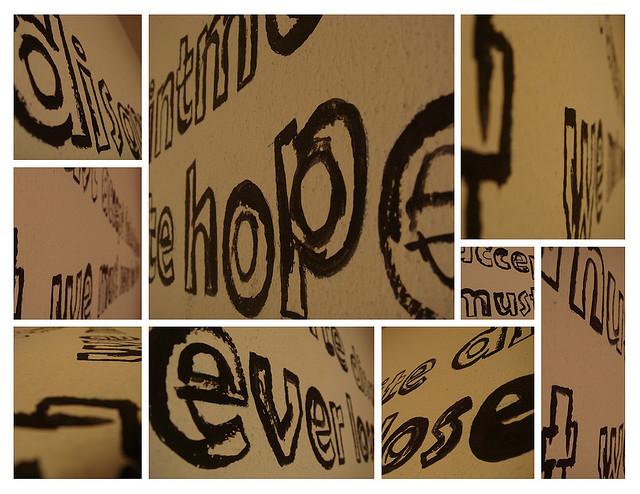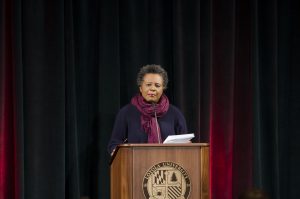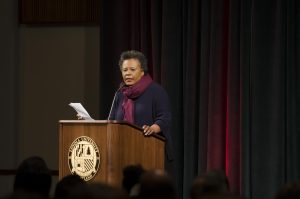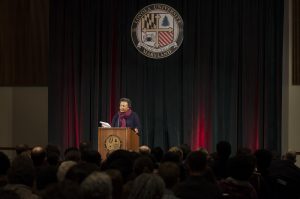On Monday, January 18, Loyola hosted its annual Martin Luther King, Jr. convocation, headlined by Ms. Claudia Rankine, author of “Citizen: An American Lyric,” which she wrote following the death of Trayvon Martin.
The underlying message throughout much of what Ms. Rankine shared is outlined by the quote, ““It really boils down to this: that all life is interrelated. We are all caught in an inescapable network of mutuality, tied into a single garment of destiny. Whatever affects one directly, affects all indirectly. We are made to live together because of the interrelated structure of reality,” which was given by Dr. Martin Luther King, Jr. at a commencement speech in 1961.
“It matters to my life what you do with your life,” Ms. Rankine remarked.
Ms. Rankine expressed, through videos, her speech, and excerpts of her book, the extent of injustice and inequality that persists in our modern-day culture as well as the ways that today’s advancements play a part in the fight for equality.
Ms. Rankine focused a significant portion of her speech on the influence of technology on modern culture. She explained that one of the concerns is that “the means by which we live outpace the ends for which we live.”
On the other hand, she also touched on many useful and progressive uses of modern technology, particularly social media, in furthering aims of social justice organizations. She commended the younger generation for the ways that they have contributed to the Black Lives Matter campaign in response to recent injustices, and she highlighted the importance of technology in immortalizing these shows of inequality.
Following her introduction, Ms. Rankine played a video of clips that portrayed police brutality and prejudice toward black Americans. She then explained that whiteness has an effect on the self-worth of people of color, which she conveyed through a video featuring skin-lightening commercials that are aired abroad.
Ms. Rankine discussed the Black Lives Matter movement, reading the organization’s mission statement, which describes the movement as “an ideological and political intervention in a world where Black lives are systematically and intentionally targeted for demise. It is an affirmation of Black folks’ contributions to this society, our humanity, and our resilience in the face of deadly oppression (blacklivesmatter.com).” She once again thanked the younger generation for the ways that they have stood up for equality by sharing the message of Black Lives Matter as well as videos and images of inequality on social media, and she commended them for being an example.
“It stopped raining. It is raining down. He won’t hang up. He’s there, he’s there but he’s hung up though he is there. Good-bye, I say. I break the good-bye. I say good-bye before anyone can hang up, don’t hang up. Wait with me. Wait with me though the waiting might be the call of good-byes,” Ms. Rankine read from a section of Citizen dedicated to Trayvon Martin entitled “My Brothers are Notorious.” She conveyed her desire to speak up and say something when she sees or hears something that offends her, and she charged audience members to speak their minds as well.
She went on to discuss briefly the murders of black women that generally go unnoticed due to the fact that they happen out of the sight of cameras, and she discussed the Million Moms march to express the significance of this injustice.
Ms. Rankine shared a brief description of poetry, and explained that poetry is able to “say more than words can say.” She then concluded her speech in saying that “its true that words can do this, but so can people.”
The evening ended with a time for questions and answers from the audience, which included Loyola students, faculty, and alumni, as well as members of the surrounding Baltimore community. Questions posed covered topics related to “Citizen” as well as Ms. Rankine’s speech. Multiple questions spoke to the idea of discomfort and political correctness as they relate to the necessary and difficult discussion on race. Ms. Rankine posed the question, “are the ramifications [and discomfort] worth your dehumanization on a daily basis?”
In relation to a question on the way to respond to negative reactions toward discussions on race, Ms. Rankine suggested that “you expect them to be defensive, but then let’s talk about it. It doesn’t matter how they react,” she says. “It matters that you speak up.”
Ms. Rankine also addressed a question regarding the possibility or bridging the racial divide that exists in our country, saying that she believes it is possible for that gap to be mended. She related the issue to that of sexual violence in our nation, saying that “we have to be as outraged for the victim as they are for themselves.”
Cover courtesy of Flickr/Lauren Holloway.




















































































































